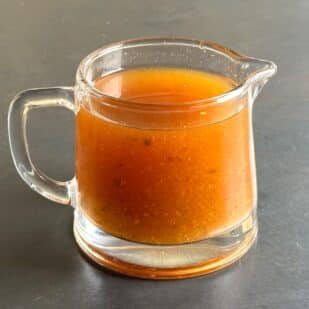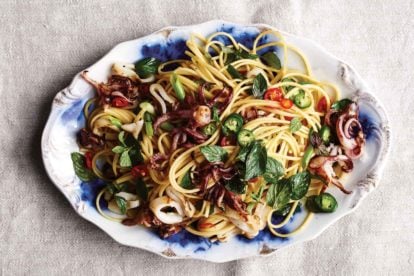Our Low FODMAP Instant Pot BBQ Brisket makes a big batch of tender meat to serve as is, or you can chop to make BBQ sandwiches. The ingredient list isn’t short, but every component adds to the final taste and texture experience, so don’t make any shortcuts.
We took advantage of Gourmend Organic Beef Bone Broth – no need to make your own. It adds moisture and flavor to our finished dish. Once you have your ingredients assembled, the prep will take mere minutes, and the Instant Pot does the rest. Note that while you can make the recipe straight through, the meat will benefit from marinating in the dry rub, so plan accordingly.

You could prep the meat the night before and finish cooking the next morning, or prep the morning of and cook it when you get home in the evening.
Try our Low FODMAP Instant Pot BBQ Brisket our Carolina Style Vinegar Slaw; the acidity cuts the richness of this dish. We like a side of potato salad, too, such as this classic rendition with hardboiled eggs.
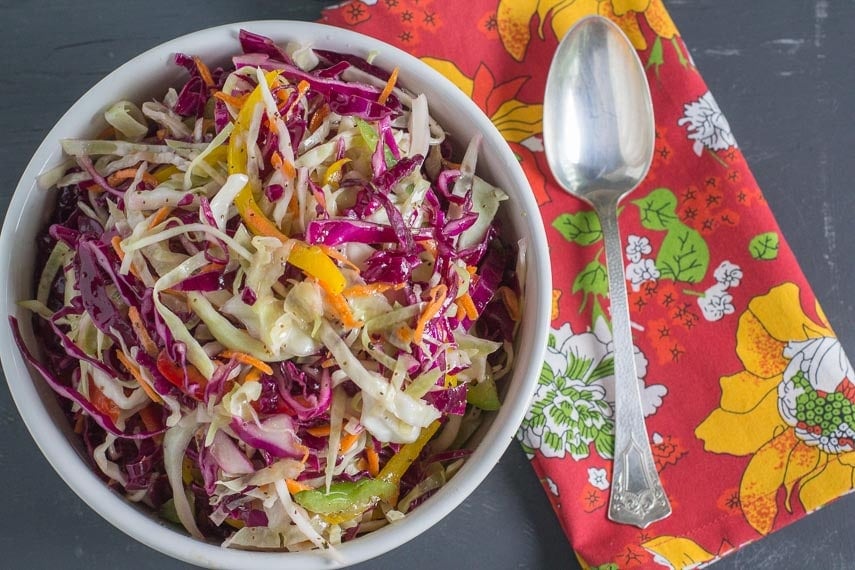
Frequently Asked Questions
If you think “chili powder” means one thing, there is a whole world of flavor out there waiting for you to experience. If you are in the US, the “chili powder” in the spice aisle is a mixture of chiles and very often garlic, along with herbs and spices. It is not the same thing as a pure ground powder made from a singular chile, which is what this is.
You can get a chile/chili education in our article Chile, Chili, Chilli and The Low FODMAP Diet.
New Mexican Chile powder is one glorious chile, dried into a powder. It has a little heat and loads of flavor. Thanks to our friend, Amy Laura, she was able to get Monash University to lab test this popular chile powder. It is listed in their app under “Red powdered Chilli (chili)”. We do not think there is a great substitute.
Conventional garlic powder is made from dried and granulated, or powdered, garlic cloves and is high FODMAP. Unless you have finished your Challenge Phase and digest fructans well, it is best avoided. And that is difficult, given that it is in so many commercially prepared products. There are a couple of low FODMAP garlic powders on the market: FreeFod Garlic Replacer and Fodmazing Garlic Substitute Replacer, which we can use on our home cooking. The FreeFod has been lab tested and is certified low FODMAP by FODMAP Friendly. Both brands contain the same ingredients – maltodextrin and natural garlic flavor. We find them to be excellent additions to your herb and spice collection. You can use them as you would conventional garlic powder, which brings a lot of freedom to your low FODMAP cooking.
If you are using it dry, such as in this dry rub, you just add it along with the other dry ingredients. If you want to dissolve it in a liquid, it is best to dissolve in a water based liquid, such as water, wine or vinegar. Do not try to blend directly with a fat, such as oil, because it will clump.
Conventional onion powder is made from dried and granulated, or powdered, onion and is considered high FODMAP. See the entry above for its garlic equivalent, as everything else is the same.
We initially assumed that there must be some kind of synthetic chemical chicanery going on in the making of “liquid smoke” flavoring. According to the Colgin Company (which has been bottling liquid smoke since the 19th century), that’s not the case, and we were pleasantly surprised.
Liquid smoke is made by channeling smoke from smoldering wood chips through a condenser, which quickly cools the vapors, causing them to liquefy (just like the drops that form when you breathe on a piece of cold glass). The water-soluble flavor compounds in the smoke are trapped within this liquid, while the non-soluble, carcinogenic tars and resins are removed by a series of filters, resulting in a clean, smoke-flavored liquid.
Liquid smoke can be used as a flavoring, just like any other herb or spice, and add dimension to your cooking.
Molasses has a very small low FODMAP serving size of 1 teaspoon (5 g) according to lab testing by Monash University. It has such a distinctive, powerful favor, that there really is no substitute, so we do like to use it when we can. The inclusion of brown rice syrup, which contains no FODMAPs, is an adjunct liquid sweetener, instead of using all molasses. If you know your tolerance to fructans and fructose, feel free to use a full 3 tablespoons if unsulphured molasses. Do not use blackstrap, which has a very different flavor.
Yes, you can cook this dish in a large Dutch-oven. You will want to simmer on low for hours until tender. Check at the 2-hour mark, but it will most likely need longer.
Yes. Set to Low and cook for 8 hours.
Making Low FODMAP Instant Pot BBQ Brisket
For the Brisket: Trim excess fat from the brisket, and if needed, cut the meat into smaller pieces to fit in your Instant Pot; I cut ours into three pieces. Pat the meat dry with paper towels.
In a small bowl, combine the brown sugar, New Mexico chile powder, paprika, smoked paprika, salt, low FODMAP garlic and onion powders, ground mustard, cumin, and black pepper until well blended.
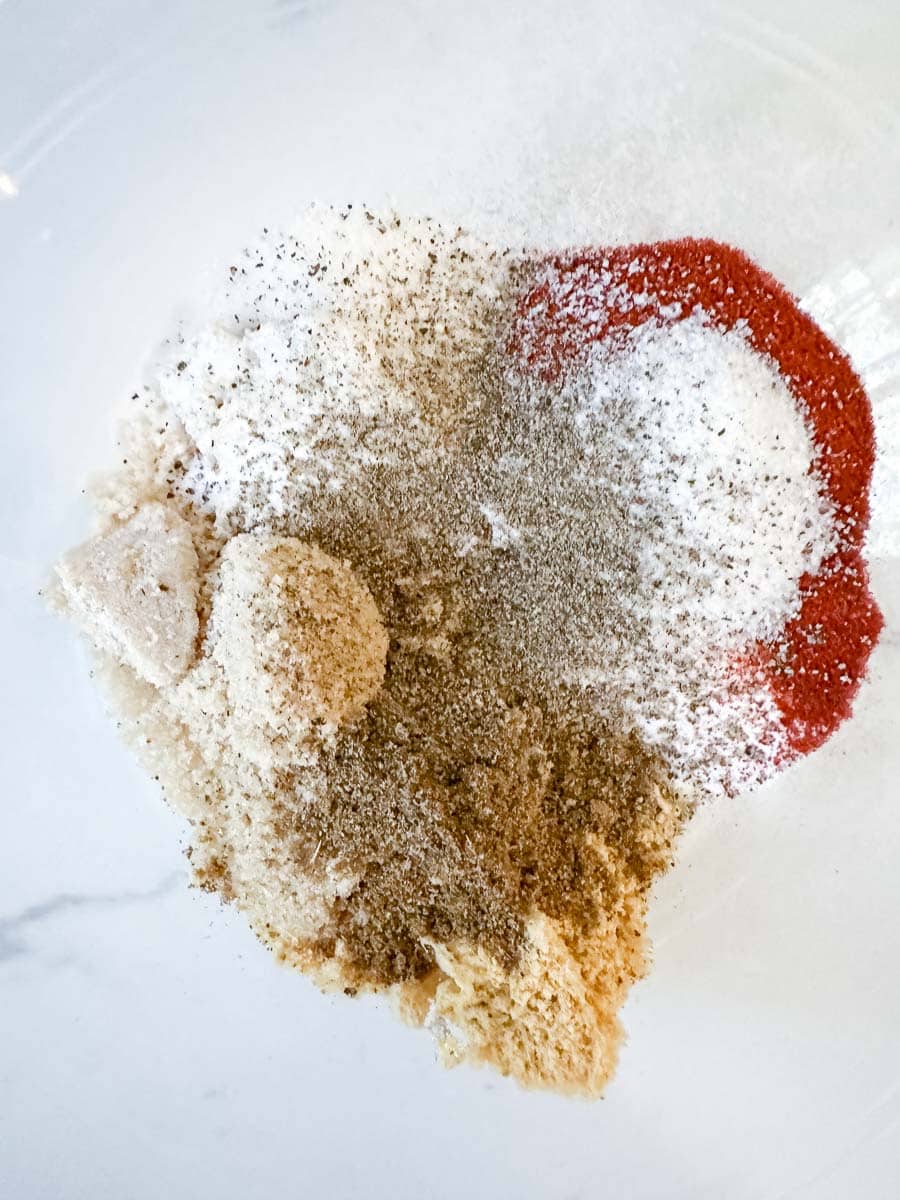
Pat this dry rub all over the meat. You may pause at this stage and place the meat in a zip top plastic bag and refrigerate for up to 24 hours before proceeding; bring meat back to room temperature if you do chill it.
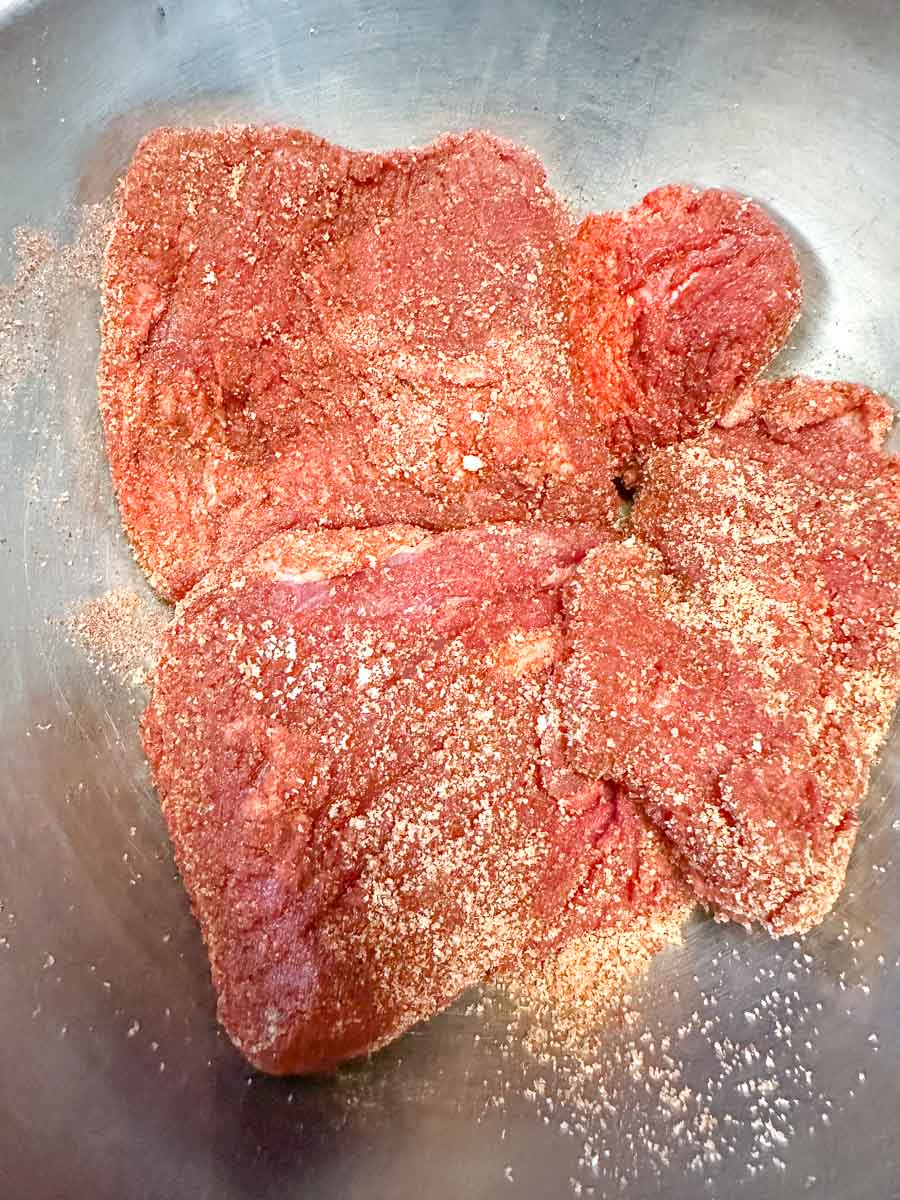
Set the Instant Pot to Sauté mode and add the Garlic-Infused Oil. When hot, sear the meat on all sides until browned; the whole process will take about 3 to 5 minutes. Do this in batches, if necessary; do not crowd the meat in the pot.
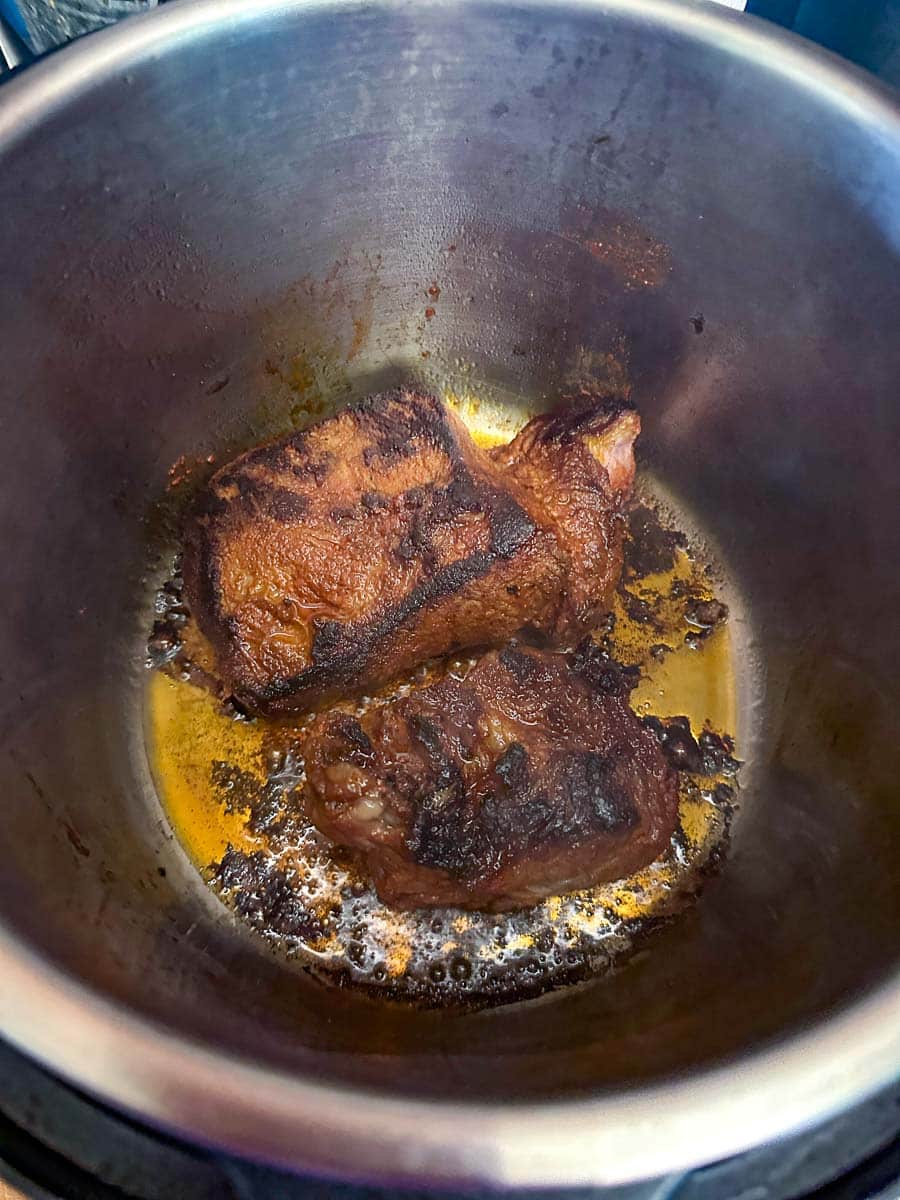
When done, turn the pot off and remove meat to a platter, momentarily. Add the broth to the pot and scrape up any luscious, browned bits from the bottom of the pot.
For the BBQ Sauce: In a medium bowl, whisk together the ketchup, brown sugar, vinegar, brown rice syrup, molasses, ground mustard, liquid smoke, and black pepper.
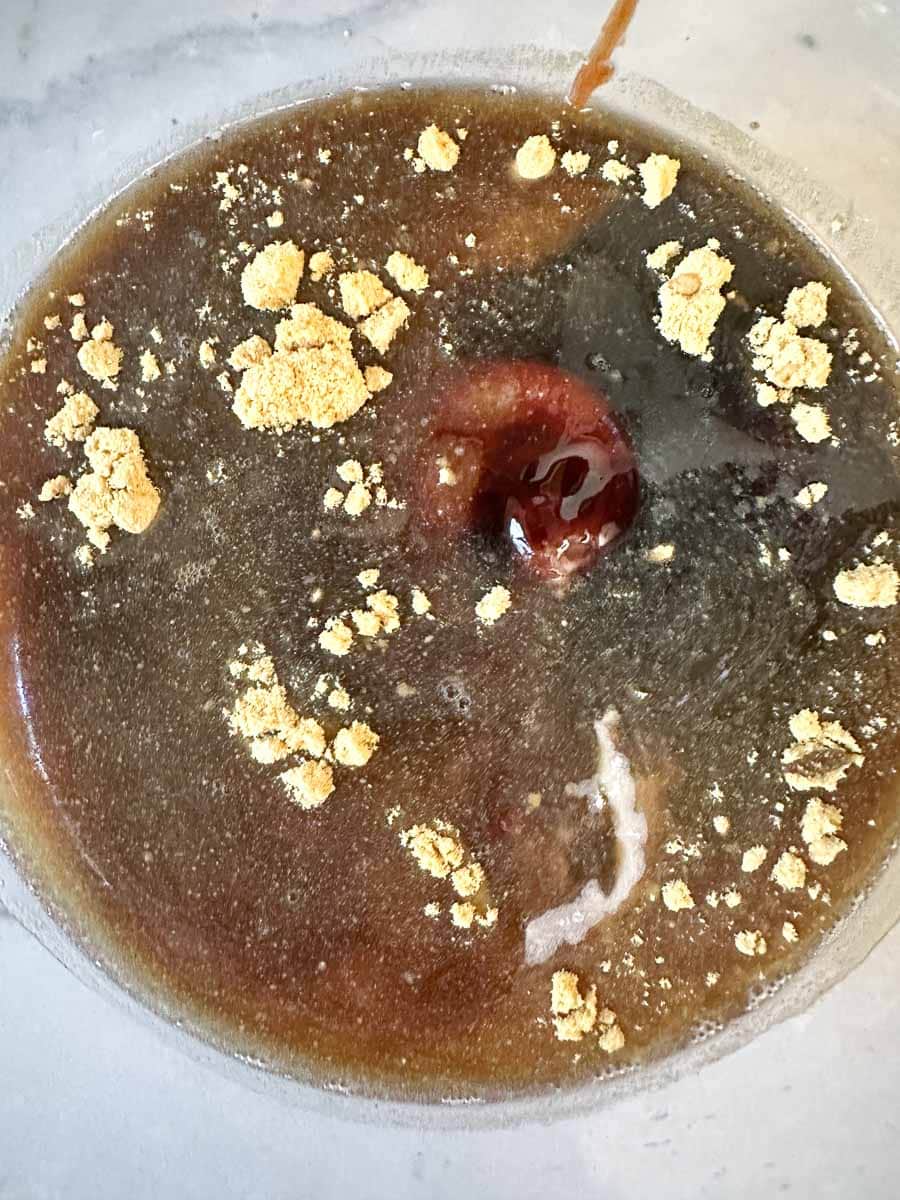
Add cayenne to taste.
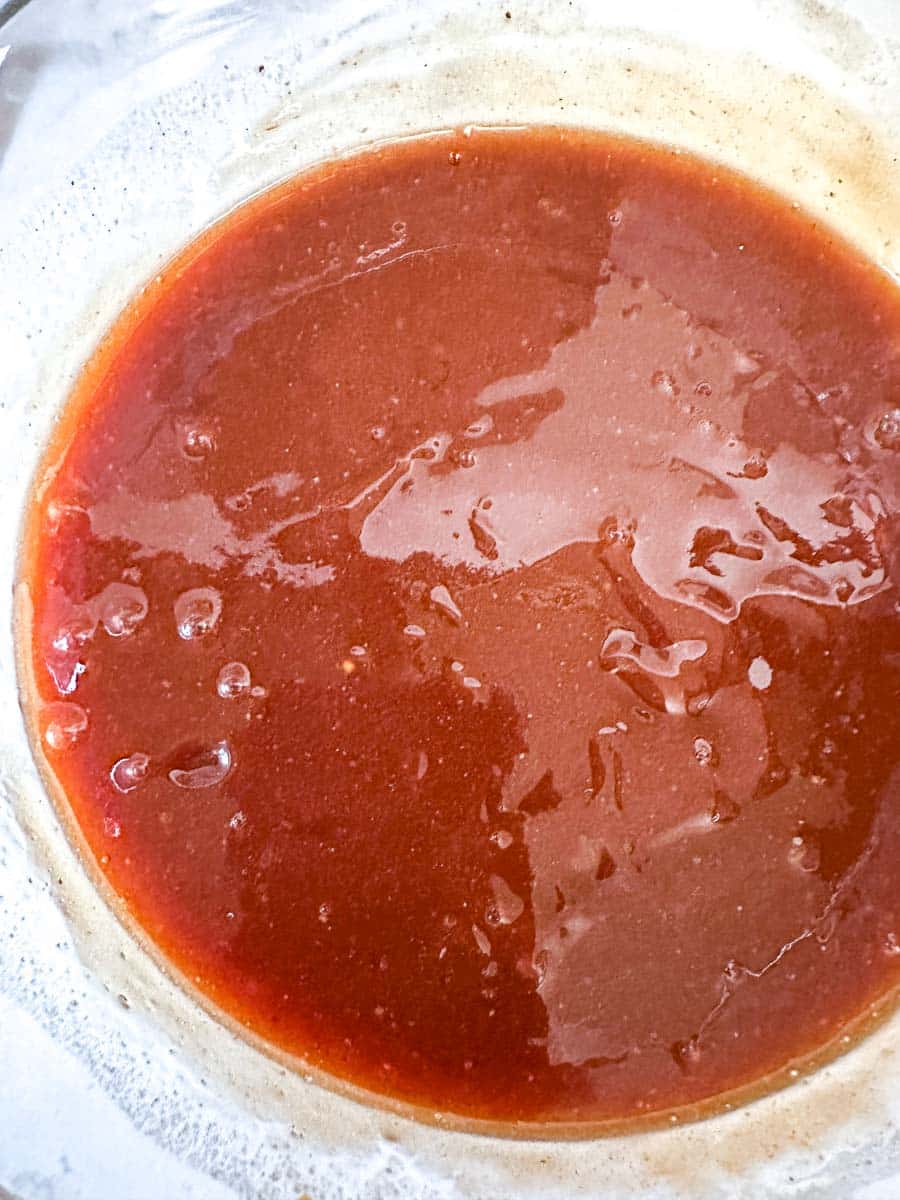
Add sauce to the pot, whisking into the broth.
To Cook the Brisket: Nestle the meat in the BBQ sauce.
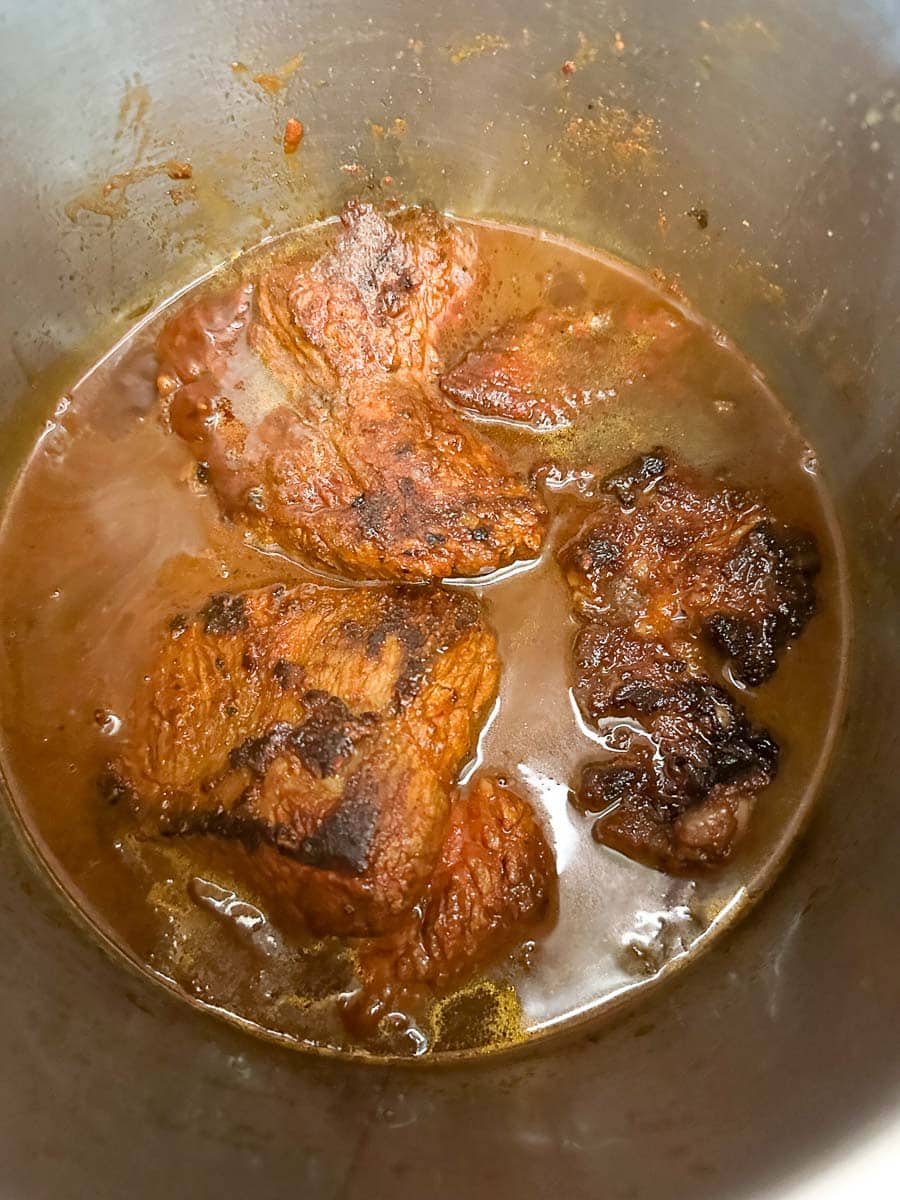
Close the lid and set the Instant Pot to Pressure Cook on Maximum, setting timer for 1 hour and 15 minutes. Warm setting off. Press Start. Allow the pot to run its cycle, and then return to normal pressure on its own, which will take about 20 to 30 minutes after the timed cooking period. Unlock the lid.
Transfer the brisket to a cutting board and cover loosely with aluminum foil. Rest meat while you reduce the sauce.
Turn the Instant Pot to Sauté, bringing sauce to a boil and let it cook until reduced and thickened, whisking occasionally, for about 5 minutes. Just go by thickness here; reduce it to your liking and keep an eye so as not to let it burn. Turn machine off.
Slice the beef brisket against the grain and serve with the BBQ sauce. You can also return the sliced brisket to the Instant Pot, nestled down in the sauce, and keep warm until serving.
Brisket in sauce will keep for 3 days in the refrigerator in an airtight container.
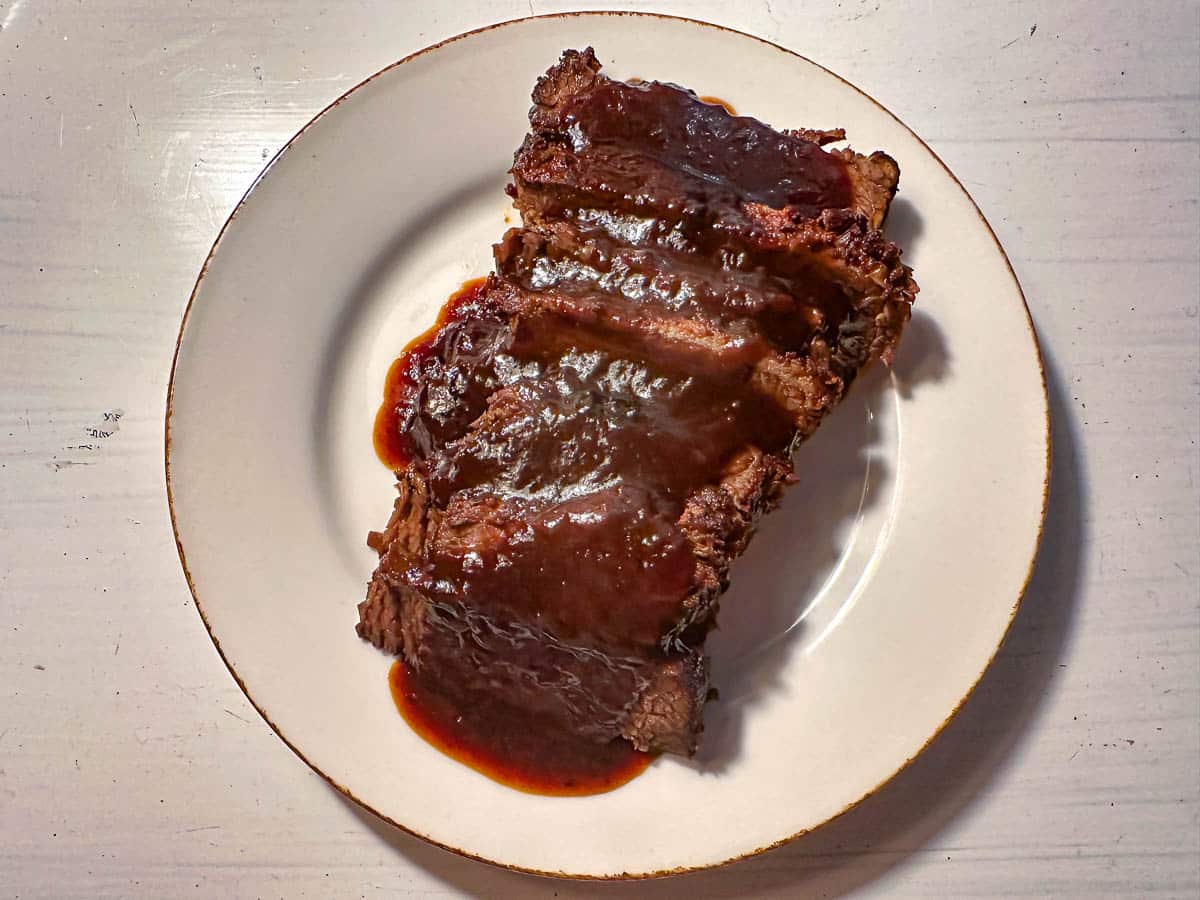
FODMAP Information
All recipes are based upon Monash University & FODMAP Friendly science at time of initial publication.
- Brown Sugar: Brown sugar has been lab tested by both Monash University and FODMAP Friendly. There are many kinds of brown sugar, from cane to beet (to blends) to Muscovado and more, which we discuss in our Explore An Ingredient: Sugar. Unfortunately, there is no information about what kind of brown sugars were lab tested. Monash gives us a low FODMAP amount of ¼ cup or 40 g but no further information. In addition, in private correspondence with Monash University we know that there are amounts larger than 40 g that would be considered low FODMAP. FODMAP Friendly gives us a low FODMAP amount of 13 g. Dark brown Muscovado sugar does appear in a product lab tested and certified low FODMAP by FODMAP Friendly, so we do know there is a low FODMAP amount.
- Chilli, red powdered: This chile powder lab tested by Monash University is New Mexico chile powder. It is low FODMAP in 2 g portions, but reaches “Moderate” at 3 g.
- Cumin: Monash University has lab tested ground cumin and also black cumin seed, which is also known as kaloonji. Both are low FODMAP in 2 g portions.
- Garlic-Infused Oil: Make your own Garlic-Infused Oil or buy a commercial equivalent for the easiest way to add garlic flavor to your food. Fructans in garlic are not oil-soluble, so garlic-infused oil is low FODMAP.
- Low FODMAP Garlic Powder: Conventional garlic powder is made from dried and granulated, or powdered, garlic cloves and is considered high FODMAP. There are a couple of low FODMAP garlic powders on the market: FreeFod Garlic Replacer and Fodmazing Garlic Substitute Replacer. The FreeFod has been lab tested and is certified low FODMAP by FODMAP Friendly. Both brands contain the same ingredients – maltodextrin and natural garlic flavor. We find them to be excellent additions to your herb and spice collection. Use them as you would conventional garlic powder.
- Low FODMAP Onion Powder: Conventional onion powder is made from dried and granulated, or powdered, onion and is considered high FODMAP. There are a couple of low FODMAP onion powders on the market: FreeFod Onion Replacer and Fodmazing Onion Substitute Replacer. The FreeFod has been lab tested and is certified low FODMAP by FODMAP Friendly. Both brands contain the same ingredients – maltodextrin and natural onion flavor. We find them to be excellent additions to your herb and spice collection. Use them as you would conventional onion powder.
- Molasses: There is a lot of confusion surrounding molasses as it is on many high FODMAP lists. Monash University and FODMAP Friendly have both lab tested molasses. FODMAP Friendly has given it a “Fail” at 15 g, but Monash tested smaller portions and gives it as Green Light Low FODMAP serving size at 1 teaspoon or 5 g.
- Paprika: Monash University has lab tested paprika and it is low FODMAP in 1 teaspoon (2g) portion. Smoked paprika is low FODMAP as well.
- Rice Syrup: Called Rice malt syrup in the Monash University app, this not-too-sweet liquid sweetener has been shown to contain no FODMAPs in lab testing. It is sometimes referred to as rice syrup or brown rice syrup.
Please always refer to the Monash University & FODMAP Friendly smartphone apps for the most up-to-date lab tested information. Foods will be retested from time to time; in the case of raw ingredients, such as fruits and vegetables, results may vary. All lab tested results are valid and represent a snapshot in time. As always, your tolerance is what counts; please eat accordingly. The ultimate goal of the low FODMAP diet is to eat as broadly as possible, without triggering symptoms, for the healthiest microbiome.
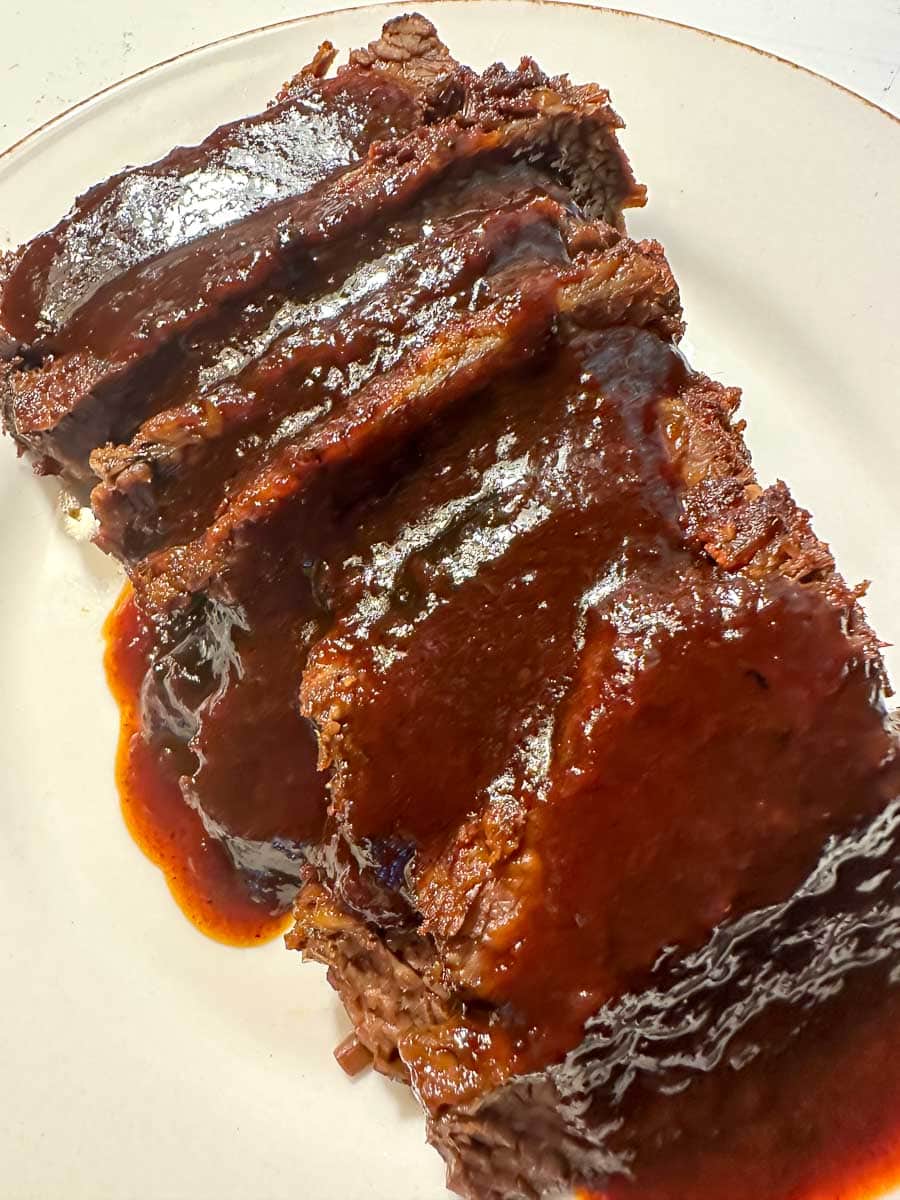
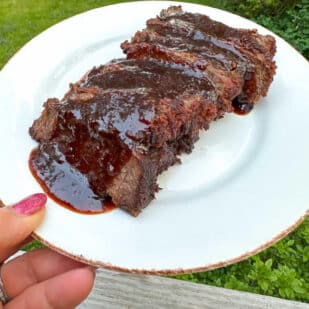
Low FODMAP Instant Pot BBQ Brisket
Our Low FODMAP Instant Pot BBQ Brisket makes a big batch of tender meat to serve as is, or you can shred to make BBQ sandwiches. The ingredient list isn’t short, but every component adds to the final taste and texture experience, so don’t make any shortcuts. We took advantage of Gourmend Organic Beef Bone Broth – no need to make your own. It adds moisture and flavor to our finished dish. Once you have your ingredients assembled, the prep will take mere minutes, and the Instant Pot does the rest. Note that while you can make the recipe straight through, the meat will benefit from marinating in the dry rub, so plan accordingly.
Ingredients:
Brisket:
- 3 ½ to 4 pound (1.6 kg to 1.8 kg) 1.6 kg to 1.8 kg beef brisket, trimmed
- 2 tablespoons firmly packed light brown sugar
- 1 tablespoon New Mexican chile powder
- 1 tablespoon paprika
- 1 tablespoon smoked paprika
- 2 teaspoons kosher salt
- 1 teaspoon low FODMAP garlic powder, such as FreeFod Garlic Replacer
- 1 teaspoon Low FODMAP onion powder, such as FreeFod Onion Replacer
- 1 teaspoon ground mustard
- 1/2 teaspoon ground cumin
- 1/4 teaspoon ground black pepper
- 2 tablespoons Garlic-Infused Oil, made with vegetable oil, or purchased equivalent
- 3/4 cup (180 ml) Gourmend Organic Beef Bone Broth
BBQ Sauce:
- 1 1/2 cups (360 ml) ketchup
- 3/4 cup (160 g) firmly packed light brown sugar
- 1/2 cup (120 ml) apple cider vinegar
- 2 tablespoons brown rice syrup
- 1 tablespoons unsulphured molasses
- 1 tablespoon Worcestershire sauce
- 2 teaspoons ground mustard
- 1 teaspoon liquid smoke
- 1/4 teaspoon ground black pepper
- Cayenne pepper, to taste
Preparation:
-
For the Brisket: Trim excess fat from the brisket, and if needed, cut the meat into smaller pieces to fit in your Instant Pot; I cut ours into three pieces. Pat the meat dry with paper towels.
-
In a small bowl, combine the brown sugar, chile powder, paprika, smoked paprika, salt, low FODMAP garlic and onion powders, ground mustard, cumin, and black pepper until well blended, then pat this dry rub all over the meat. You may pause at this stage and place the meat in a zip top plastic bag and refrigerate for up to 24 hours before proceeding; bring meat back to room temperature if you do chill it.
-
Set the Instant Pot to Sauté mode and add the Garlic-Infused Oil. When hot, sear the meat on all sides until browned; the whole process will take about 3 to 5 minutes. Do this in batches, if necessary; do not crowd the meat in the pot. When done, turn the pot off and remove meat to a platter, momentarily. Add the broth to the pot and scrape up any luscious, browned bits from the bottom of the pot.
-
For the BBQ Sauce: In a medium bowl, whisk together the ketchup, brown sugar, vinegar, brown rice syrup, molasses, ground mustard, liquid smoke, and black pepper. Add cayenne to taste. Add sauce to the pot, whisking into the broth.
-
To Cook the Brisket: Nestle the meat in the BBQ sauce. Close the lid and set the Instant Pot to Pressure Cook on Maximum, setting timer for 1 hour and 15 minutes. Warm setting off. Press Start. Allow the pot to run its cycle, and then return to normal pressure on its own, which will take about 20 to 30 minutes after the timed cooking period. Unlock the lid.
-
Transfer the brisket to a cutting board and cover loosely with aluminum foil. Rest meat while you reduce the sauce.
-
Turn the Instant Pot to Sauté, bringing sauce to a boil and let it cook until reduced and thickened, whisking occasionally, for about 5 minutes. Just go by thickness here; reduce it to your liking and keep an eye so as not to let it burn. Turn machine off.
-
Slice the beef brisket against the grain and serve with the BBQ sauce. You can also return the sliced brisket to the Instant Pot, nestled down in the sauce, and keep warm until serving.
-
Brisket in sauce will keep for 3 days in the refrigerator in an airtight container.
Notes:
FODMAP Information
All recipes are based upon Monash University & FODMAP Friendly science at time of initial publication.
• Brown Sugar: Brown sugar has been lab tested by both Monash University and FODMAP Friendly. There are many kinds of brown sugar, from cane to beet (to blends) to Muscovado and more, which we discuss in our Explore An Ingredient: Sugar. Unfortunately, there is no information about what kind of brown sugars were lab tested. Monash gives us a low FODMAP amount of ¼ cup or 40 g but no further information. In addition, in private correspondence with Monash University we know that there are amounts larger than 40 g that would be considered low FODMAP. FODMAP Friendly gives us a low FODMAP amount of 13 g. Dark brown Muscovado sugar does appear in a product lab tested and certified low FODMAP by FODMAP Friendly, so we do know there is a low FODMAP amount.
• Chilli, red powdered: This chile powder lab tested by Monash University is New Mexico chile powder. It is low FODMAP in 2 g portions, but reaches “Moderate” at 3 g.
• Cumin: Monash University has lab tested ground cumin and also black cumin seed, which is also known as kaloonji. Both are low FODMAP in 2 g portions.
• Garlic-Infused Oil: Make your own Garlic-Infused Oil or buy a commercial equivalent for the easiest way to add garlic flavor to your food. Fructans in garlic are not oil-soluble, so garlic-infused oil is low FODMAP.
• Low FODMAP Garlic Powder: Conventional garlic powder is made from dried and granulated, or powdered, garlic cloves and is considered high FODMAP. There are a couple of low FODMAP garlic powders on the market: FreeFod Garlic Replacer and Fodmazing Garlic Substitute Replacer. The FreeFod has been lab tested and is certified low FODMAP by FODMAP Friendly. Both brands contain the same ingredients – maltodextrin and natural garlic flavor. We find them to be excellent additions to your herb and spice collection. Use them as you would conventional garlic powder.
• Low FODMAP Onion Powder: Conventional onion powder is made from dried and granulated, or powdered, onion and is considered high FODMAP. There are a couple of low FODMAP onion powders on the market: FreeFod Onion Replacer and Fodmazing Onion Substitute Replacer. The FreeFod has been lab tested and is certified low FODMAP by FODMAP Friendly. Both brands contain the same ingredients – maltodextrin and natural onion flavor. We find them to be excellent additions to your herb and spice collection. Use them as you would conventional onion powder.
• Molasses: There is a lot of confusion surrounding molasses as it is on many high FODMAP lists. Monash University and FODMAP Friendly have both lab tested molasses. FODMAP Friendly has given it a “Fail” at 15 g, but Monash tested smaller portions and gives it as Green Light Low FODMAP serving size at 1 teaspoon or 5 g.
• Paprika: Monash University has lab tested paprika and it is low FODMAP in 1 teaspoon (2g) portion. Smoked paprika is low FODMAP as well.
• Rice Syrup: Called Rice malt syrup in the Monash University app, this not-too-sweet liquid sweetener has been shown to contain no FODMAPs in lab testing. It is sometimes referred to as rice syrup or brown rice syrup.
Please always refer to the Monash University & FODMAP Friendly smartphone apps for the most up-to-date lab tested information. Foods will be retested from time to time; in the case of raw ingredients, such as fruits and vegetables, results may vary. All lab tested results are valid and represent a snapshot in time. As always, your tolerance is what counts; please eat accordingly. The ultimate goal of the low FODMAP diet is to eat as broadly as possible, without triggering symptoms, for the healthiest microbiome.
Nutrition
All nutritional information is based on third-party calculations and should be considered estimates. Actual nutritional content will vary with brands used, measuring methods, portion sizes and more. For a more detailed explanation, please read our article Understanding The Nutrition Panel Within Our Recipes.

